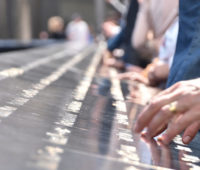Ten years on, remembering 9/11 has become an event in and of itself. There is much to honor through memory—the loss of innocent lives, the sacrifice of the first responders, the coming together of communities, from the local to the global, against the terrorist attack on the United States. But there are also moments we […]
In the days immediately following September 11, 2001, the Council invited a wide range of leading social scientists from around the world to write short essays for an online forum, After September 11. Written against two-week deadlines when it was difficult to come by sure knowledge in a time of quickly changing circumstances, the forum’s essays would be downloaded millions of times and used extensively by teachers and journalists.
A decade later, contributors to the original forum were asked to reflect on what they wrote and to explore what has changed and what remains the same since those harrowing times. The result is this extraordinary digital collection of new essays, 10 Years after September 11. Short and written in a style that is accessible to both academic and non-academic readers, the essays offer deep, expert analysis of developments since 9/11 from the perspectives of the social sciences.
A Decade of the “War on Terror” and the “Responsibility to Protect”: The Global Debate about Military Intervention
by Mary KaldorIn 2001, before September 11, it seemed as though the world was moving inexorably toward a new humanitarian norm of military intervention in cases of massive human suffering, and in particular, genocide, ethnic cleansing, and large-scale human rights violations. Several reports were published in 2000 and 2001 that strengthened the case for humanitarian intervention. [...]
The 9/11 Syndrome: Europe, Islam, and Muslims
by Rajeev BhargavaThe rest of the world should be grateful to Western civilization for having given it the concept of human rights. There are some things we cannot do to others, not because it is God’s command, because we will go to hell or earn spiritual demerit, but because of certain capacities that people possess. We cannot harm others because this is what we minimally owe them. This realization does not entail the idea of human rights as supreme, something over and above all other values in every context and at all times. [...]
America’s Global Implosion: From the Washington Consensus to the Arab Spring
by Neil SmithThe most unpredictable result of the aftermath of 9/11 was surely the massive implosion of US global power. A lot was of course predictable in the aftermath. It was clear that the US state would appoint itself the “global executioner,” as we suggested then, although less clear how this would work through. [...]
“Rescue” Ten Years Out: An Anecdotal Report on Afghan Women’s Challenges
by Margaret MillsAfter nearly a decade of foreign military intervention and with a visibly deteriorating security situation that has affected most of the country over the last three to five years, the primary concern of Afghan women and their families remains physical security, and second to that, economic and food security. [...]
Change in Another Decade of Civic War
by Peter Alexander MeyersMay Day. It is the feast of pagans and socialists and the namesake of distress. We are ten years into the age of 9/11. George W. Bush is gone and Barack Obama is again casting his voice into the air. No lilting refrain. No poetry. The president is most intent on gravity, although the teleprompter is oddly placed so he cannot look us in the eye. Here is a familiar story retold. Once upon a time, there was a bad man, an enemy to even his own people, like Benedict Arnold or Rasputin or John Wayne Gacy. [...]
Since September 11, 2001 . . .
by Veena DasA decade of intense theorizing on the forms of violence and human degradation, on global connectivity, on demands that scholarship be done in “real time” . . . a sense of urgency . . . disciplines are aggressively asked to prove their relevance . . . a deep disquiet on the part of many radical scholars and public intellectuals that the American public is increasingly becoming complicit in projects of warfare. We ask, are our senses being so retrained now that we cannot see the suffering of others or hear their cries? [...]
Echoes of 9/11: Anti-politics and Politics from Bush to Obama
by Dick HowardOn November 12, 2001, I received a request from the German journal Kommune to send for their next issue, which was already in press, some reflections on the events of 9/11 and their implications for the future. The invitation was welcome; after all, what can an intellectual do in the face of such total destruction but try to construct some sense by using his most familiar tool, the word? [...]
Unfulfilled Expectations of Democracy: Political Developments in Central Asia after 9/11
by Alisher IlkhamovBefore and after the collapse of the Soviet Union, Central Asia didn't rank among the regional priorities of US foreign policy. Neither did ordinary Americans have much interest in this region. In 2000, taking part in a scholarly conference held at the University of Wisconsin–Madison, I dared to complain that, to my observation, the average US citizen often doesn’t have any idea about the very existence of Uzbekistan and other Central Asian “stans” or where they are located. [...]
The End of the American Century: 9/11 Ten Years On
by David Held9/11 was a crime against the United States and a crime against humanity. Treating the criminals who perpetrated it as soldiers at war with the United States and the West only elevated their status and standing and began the “War on Terror.” The war was as ill formulated as it was executed. [...]












